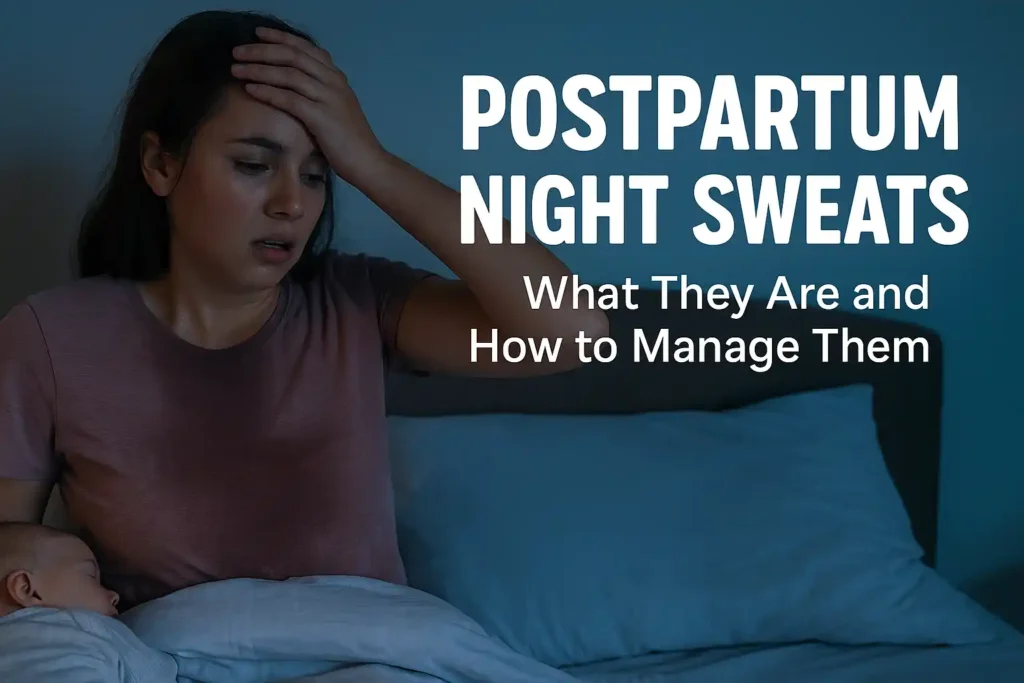Postpartum night sweats are intense episodes of sweating that affect up to 83% of new mothers, especially in the first few weeks after childbirth. They’re caused by a sudden drop in estrogen as your body adjusts hormonally and flushes out extra fluid from pregnancy. This typically happens during the first 2–6 weeks postpartum, also called the fourth trimester.
Key Takeaways
- Over 80% of new mothers experience post-pregnancy sweating
- Hormone fluctuations drive sudden temperature regulation changes
- Symptoms usually resolve within 6 weeks postpartum
- Nighttime sweating peaks during the first month after delivery
- Practical solutions exist to improve sleep quality immediately
You’re not imagining those 3 AM sweat-soaked sheets. And you’re definitely not alone. This process helps your body get rid of almost 30% of pregnancy water. The trick is to find ways to feel better while your body adjusts.
Try using moisture-wicking pajamas and drinking water to help. We’ll look at ways to help you sleep better and wake up feeling fresh, even during this time of change.

Introduction: Why You’re Waking Up Drenched After Giving Birth
Waking up in sweat after having a baby is normal. It’s your body’s way of healing. These night sweats are a natural part of adjusting to life with a new baby. Let’s look at why this happens and how it fits into your postpartum journey.
You’re Not Alone: Postpartum Night Sweats Are Real and Common
Up to 80% of new parents get night sweats early on. Studies show this happens most in the first 10 days after birth. Many find themselves changing into dry clothes several times a night.
Your body is doing a lot of work. It’s getting rid of extra water from pregnancy. It’s also adjusting to lower estrogen levels and learning to regulate your temperature again.
“The first time I woke up soaked, I thought I’d wet the bed. My OB reassured me it was normal – just my body shedding pregnancy weight in liquid form.”
The “Fourth Trimester” and Why Your Body’s Stil Changing
The first 12 weeks after birth are big changes for you, not just your baby. Night sweats are part of these changes during the fourth trimester:
| Pregnancy State | Postpartum Change | Impact on Sweating |
|---|---|---|
| High blood volume | Fluid elimination | Excess sweat/urine |
| Elevated estrogen | Hormone crash | Hot flashes |
| Uterine expansion | Organ repositioning | Metabolic shifts |
This time helps your body get back to how it was before pregnancy. It’s intense, but usually, things settle down in about 6 weeks. Hormones and fluid levels will start to get back to normal.
What Causes Postpartum Night Sweats?
Waking up drenched in sweat after childbirth isn’t just uncomfortable. It’s your body sending signals about its recovery journey. Let’s break down the science behind those midnight soak sessions and why they’re part of your postpartum transition.
Hormonal Shifts: The Drop in Estrogen and Its Effects
Your estrogen levels plummet by 90% within 24 hours after delivery. That’s like jumping off a hormonal cliff. This sudden change confuses your hypothalamus (your body’s thermostat), making it overreact to minor temperature changes.
Progesterone, which kept you warm during pregnancy, also crashes. This creates a perfect storm for sweat episodes.
“The postpartum hormone shift is more dramatic than menopause, but most women aren’t prepared for it,”
| Hormone | Pregnancy Level | Postpartum Level | Effect on Body |
|---|---|---|---|
| Estrogen | High | Very Low | Disrupted temperature control |
| Progesterone | Elevated | Drops rapidly | Increased sweating response |
| Prolactin | Moderate | High (if breastfeeding) | Metabolic boost |
Your Body Resetting: Adjusting to Not Being Pregnant
Your system is working overtime to:
- Process 50% more blood volume from pregnancy
- Flush out retained fluids through sweat and urine
- Rebalance kidney function
This detox phase peaks around day 5 postpartum. One mom described it as “my body crying through its pores” – a vivid but accurate portrayal.
Other Possible Contributors: Stress, Fatigue, Breastfeeding
Breastfeeding burns 300-500 extra calories daily. That metabolic furnace doesn’t shut off at bedtime. Combine this with:
- Sleep deprivation disrupting cortisol levels
- Physical recovery from birth
- Anxiety about newborn care
Studies show night sweats intensify when cortisol (stress hormone) remains elevated at night. The good news? These factors typically ease as you settle into new routines.
How Long Do Postpartum Night Sweats Last?
Waking up drenched night after night can be tough. You might wonder when your body will stop sweating so much. For most moms, postpartum sweating is temporary. But, the exact timeline can vary.
Knowing what’s normal can help you prepare. And, it’s a good idea to have extra pajamas on hand.
Typical Timeline: From Birth Through the First 6 Weeks
Your body starts shedding excess fluids and hormones right after delivery. Here’s what you can expect:
- Days 1-7: Heavy sweating as your kidneys flush out pregnancy fluids
- Weeks 2-3: Gradual decrease in intensity for most women
- Week 6: Cleveland Clinic notes symptoms usually resolve by this milestone
When It Peaks: The First 2 Weeks Post-Birth
The worst episodes often hit between days 5-14. Two main factors cause this surge:
- Plummeting estrogen levels disrupt temperature control
- Your body eliminates 30-50% of pregnancy blood volume
One mom described it perfectly: “I’d wake up shivering in a puddle – like my body forgot how to thermostat.”
When to Worry: Night Sweats That Don’t Go Away
While most cases fade by 6 weeks, persistent sweating could signal:
- Thyroid dysfunction (common postpartum)
- Undiagnosed infection
- Hormone imbalances needing treatment
Contact your provider if you experience fever over 100.4°F, rapid weight loss, or racing heartbeat. This is true if symptoms continue past 8 weeks.
What Do Postpartum Night Sweats Feel Like?

Waking up in a cold, damp puddle is not just uncomfortable. It’s also confusing during a vulnerable time. Postpartum night sweats are more than just sweating. They make you wonder if you spilled water or sweated through clothes.
Real Mom Descriptions: “Soaked Sheets,” “Waking Up Freezing,” and More
Mothers say postpartum sweating feels like sudden weather changes. It’s hot, then cold. “I’d wake up shivering, but my pajamas were stuck to me like I’d run a marathon,” says Amanda, a mom of twins. Others talk about:
- Drenched hairlines needing midnight towel swaps
- Mattress pads needing daily rotation
- Cold sweats triggering 3 AM outfit changes
“It felt like my body forgot how to regulate temperature. One minute I’m roasting, the next I’m shaking under three blankets.”
Nighttime Odor Changes: Why You Might Smell Different
Many notice a sharper, muskier scent with postpartum sweat. Hormonal changes affect sweat gland pH levels. This changes how bacteria interact with sweat. Breastfeeding moms often smell stronger due to prolactin’s effect.
This postpartum sweat smell usually goes away as hormones stabilize. Dermatologists say these postpartum skin changes are temporary. If smells last more than 8 weeks, see a doctor to check for infections or thyroid issues.
Coping Strategies That Actually Help
Waking up drenched night after night doesn’t have to be your new normal. These battle-tested strategies help you reclaim rest while your body adjusts. Let’s break down what works – and why – so you can sleep cooler tonight.
Stay Cool at Night: Fans, AC, Cooling Mattress Pads
Thermostat wars end here. Set your bedroom temperature between 65-68°F – the sweet spot for sweat prevention. Place a portable fan near your bed to circulate air without blowing directly on your baby. For quick relief:
- Freeze a damp washcloth for 30 minutes before bed
- Use cooling gel pads under your pillowcase
- Try moisture-wicking mattress protectors (look for bamboo blends)
Dress Right: Breathable Fabrics and Layering
Your old cotton tee might trap heat. Opt for loose-fitting pajamas with:
| Material | Benefits | Best For |
|---|---|---|
| Bamboo viscose | 4x more absorbent than cotton | Heavy sweaters |
| Merino wool | Temperature-regulating | Cold flashes |
Layer a thin robe over tank tops for easy adjustments when temperatures swing.
Stay Hydrated: Water Intake for Breastfeeding and Recovery
Breastfeeding moms need 16 cups daily – dehydration worsens sweating. Use this color guide:
Pale lemonade = hydrated
Dark apple juice = drink up
Keep insulated bottles bedside. Add electrolyte tabs if you’re pumping or nursing overnight.
Towel Tricks and Bedding Tips
Layer your sleep space like a sweat-proof sandwich:
- Moisture-wicking mattress pad
- Cotton fitted sheet
- Turkish towel (dries faster than terry cloth)
- Lightweight blanket
Keep extra pillowcases and a dry towel in your nightstand for 3 AM swaps. Sprinkle cornstarch-based powder on sheets to absorb moisture without skin irritation.
Lifestyle Tips for Managing Night Sweats

Making small changes in your daily life can help a lot with night sweats after having a baby. Hormonal changes cause a lot of sweating. But, simple changes can help your body adjust and aid in recovery.
Mind Your Diet: Avoiding Alcohol, Caffeine, and Processed Foods
What you eat and drink affects how your body regulates temperature. Alcohol and caffeine make blood vessels wider, leading to more sweat. Also, processed foods can cause dehydration because of their high sodium. Try to eat:
- Herbal teas like peppermint or lemon balm
- Whole foods rich in magnesium (spinach, almonds)
- Cooling fruits like watermelon or cucumber
Gentle Exercise: Walking, Stretching, and Pilates
Doing low-impact exercises helps keep cortisol levels in check, which is good for postpartum fatigue. A short walk or pelvic floor exercises are great. Many moms find yoga in the evening helps them relax before bed:
| Activity | Duration | Benefits |
|---|---|---|
| Postnatal Pilates | 20 minutes | Strengthens core, reduces tension |
| Neck stretches | 5 minutes | Relaxes shoulder muscles |
| Evening walk | 10-15 minutes | Lowers stress hormones |
Supplements and Vitamins: Replenishing What’s Lost
Postnatal vitamin depletion is common after pregnancy, and it’s worse for breastfeeding moms. Talk to your doctor about taking:
- Electrolyte powders (sodium-free options)
- Vitamin B complex for energy
- Calcium-magnesium blends
Managing Sleep Hygiene and Rest
Keep your sleep area cool to fight hormonal imbalances postpartum. Wear moisture-wicking pajamas and take naps when you can. Try to avoid screens for at least an hour before bed. Blue light can mess with your sleep.
Emotional Effects of Postpartum Night Sweats
Postpartum night sweats are not just physical. They also affect your mind. Hormonal changes, sleep loss, and pressure to “bounce back” can lead to mental health issues. Let’s explore how these night sweats impact your feelings and why they’re okay.
The Stress of Interrupted Sleep
Waking up soaked many times a night is tough. It messes up your sleep patterns. Studies say new parents lose 6 months’ worth of sleep in the first two years. Night sweats make it even harder.
Your brain might struggle with:
- Emotional control (unexpected tears)
- Making decisions (like, did I put milk in the pantry?)
- Handling stress (getting upset over small things)
A 2023 UCLA study found moms with night sweats had 47% higher cortisol levels than others. Here are some ways to cope:
“I started doing 20-minute power naps when baby slept. It didn’t fix the sweats, but helped me handle the emotional rollercoaster better.” – Jenna, mom of twins
Feeling Isolated or Embarrassed
Many moms hide their night sweat struggles, fearing judgment. You might:
- Avoid nighttime intimacy with your partner
- Cancel morning plans due to exhaustion
- Feel “gross” compared to social media moms
This isolation can make postpartum anxiety worse. Here’s how to break the cycle:
- Share your experience with trusted friends
- Join virtual support groups (Postpartum Support International has 24/7 help)
- Use moisture-wicking pajamas to feel more confident
The Link Between Night Sweats and Postpartum Depression
Persistent night sweats might signal deeper issues. Johns Hopkins research shows:
| Symptom Duration | PPD Risk Increase |
|---|---|
| 2-4 weeks | 22% higher |
| 6+ weeks | 61% higher |
Watch for these signs during your 6-week checkup:
- Crying spells lasting >30 minutes
- Loss of interest in your baby
- Withdrawal from all social contact
If night sweats come with racing thoughts or hopelessness, see your OB-GYN right away. They can offer therapy or safe antidepressants that are okay for breastfeeding.
What Moms Say Didn’t Work

Not every remedy works as promised—here’s what real moms say failed to ease their postpartum night sweats. While well-meaning advice floods parenting forums, some solutions create more discomfort or even pose risks. Let’s separate hopeful myths from evidence-based strategies.
Ice Packs, Herbal Teas, and Sleepless Nights
Many moms try cooling tactics like ice packs under pillows, but results are mixed. “I woke up shivering, then sweating again within an hour,” shares Jenna, a mother of twins. Obstetricians caution against prolonged cold exposure, which can disrupt your body’s natural temperature regulation during recovery.
Popular herbal teas also backfire for some. While chamomile seems harmless, ingredients like sage or peppermint may reduce milk supply. One study found 34% of lactation consultants report herbs interfering with breastfeeding goals. Unsafe options include:
- Valerian root (causes drowsiness that disrupts newborn care)
- Black cohosh (linked to liver toxicity in postpartum patients)
- Licorice root (raises blood pressure risks)
Trial and Error: Stories of Frustration
Moms often cycle through remedies without success. “I spent $80 on cooling mattress pads, only to sweat through them nightly,” says Marisol. Others describe strict diets or excessive hydration attempts that left them bloated but yet sweaty.
“After weeks of trial and error, I realized some things just need time—not another Amazon order.”
Key lessons from these experiences? Quick fixes rarely address hormonal root causes. If a home remedy for postpartum night sweats demands constant effort or feels unsustainable, it’s likely not the best postpartum night sweats home remedy for you. Always consult your OB-GYN before trying new treatments.
When Should You See a Doctor?
Postpartum night sweats are usually not a big deal. But, some signs need quick medical help. Knowing the difference is key to taking care of yourself.
Signs of Something More Serious: Fever, Chills, and Racing Heartbeat
Watch out for these signs:
- A fever over 100.4°F (38°C) – a sign of infection
- Unexplained weight loss or a fast heartbeat
- Chills that make your body shake a lot
These could mean mastitis, urinary tract infections, or sepsis. A study showed 15% of postpartum fevers need antibiotics.
Could It Be Thyroiditis or Infection?
Postpartum thyroiditis affects 5-10% of new moms. It causes sweats and chills. Your doctor might:
- Check TSH and T4 hormone levels
- Look for antithyroid antibodies
- Test white blood cells for infections
Also, watch for hair loss, extreme tiredness, or mood swings. These often mean thyroid problems.
Persistent Symptoms Beyond 6 Weeks
Most night sweats go away by week six. But, if they don’t, it could mean:
- Undiagnosed thyroid issues
- Hormonal birth control side effects
- Early perimenopause (rare but possible)
The Cleveland Clinic says see a doctor if symptoms last longer. Your doctor might do blood tests or suggest changes for recovery.
Tests Your Doctor Might Order
If you’re worried about night sweats, your doctor might suggest some tests. These tests check for hormonal or emotional health issues. Knowing what to expect can make you feel better and help you get ready for your visit.
Thyroid Hormone Levels and Blood Sugar
Changes in thyroid hormones can cause night sweats. Doctors usually check:
- TSH (thyroid-stimulating hormone) test: Normal range is 0.4–4.0 mIU/L. Levels above 10 may show postpartum thyroiditis.
- Free T4 test: Checks active thyroid hormone (ideal range: 0.8–1.8 ng/dL).
- HbA1c blood test: Looks for blood sugar issues that might cause sweating (normal: below 5.7%).
| Test | Purpose | Normal Range | Postpartum Red Flags |
|---|---|---|---|
| TSH | Thyroid function | 0.4–4.0 mIU/L | >10 mIU/L |
| Free T4 | Active thyroid hormone | 0.8–1.8 ng/dL | 2.5 ng/dL |
| HbA1c | 3-month blood sugar average | >6.4% |
Evaluating Mood Disorders and Sleep Deprivation
Long-lasting sweating can also mean mood changes. Doctors use:
- Edinburgh Postnatal Depression Scale: 10-question screening for depression/anxiety
- Sleep diaries: Track nighttime awakenings and sweat episodes
- Iron/ferritin tests: Low levels worsen fatigue and emotional resilience
One OB-GYN says: “We screen all patients with prolonged sweating for thyroid issues and mood changes – catching these early improves recovery.”
Natural Remedies Moms Swear By
Explore natural remedies trusted by postpartum moms worldwide. These methods mix ancient wisdom with modern science. They help manage night sweats and support recovery. Let’s look at three strategies that are both comfortable and safe.
Foot Reflexology and Back Massage
Many new mothers find relief through pressure point therapy. Reflexology targets zones in the feet linked to organs and glands. It may help control body temperature.
A 2022 NCCIH review found massage therapy can lower stress hormones by up to 31% in postpartum women.
| Technique | Benefit | How to Apply |
|---|---|---|
| Arch Pressure | Supports kidney function | Use thumbs in circular motions |
| Heel Squeeze | Promotes pelvic circulation | Apply firm but gentle pressure |
| Upper Back Kneading | Relieves tension | Use palm heels along spine |
CBT for Insomnia and Stress Management
Cognitive Behavioral Therapy for Insomnia (CBT-I) helps break the cycle of anxiety about sleep. Studies show it improves sleep efficiency by 30% in postpartum women within 4 weeks. You’ll learn to:
- Replace negative thoughts about night sweats
- Establish consistent wake-up times
- Create pre-sleep relaxation rituals
Herbal Options: Valerian Root, Chamomile, and Lavender
While herbs can be helpful, valerian root safety requires special attention during breastfeeding. The American Pregnancy Association suggests these herbal options postpartum:
- Chamomile tea: 1 cup before bed (caffeine-free)
- Lavender oil: 2 drops on pillowcase
- Lemon balm: Safe alternative to valerian
Always consult your healthcare provider before trying new supplements, specially while nursing.
Conclusion: Patience, Support, and Listening to Your Body
Postpartum recovery can be tough, and waking up drenched is a challenge. Hormonal changes cause intense night sweats, but they usually go away. Cleveland Clinic researchers say these changes show your body is adjusting.
Start managing symptoms with small steps. Use apps like Waterllama to track your water intake if you’re breastfeeding. Keep a towel and extra pajamas ready for quick changes at night. Talk to support groups like Postpartum Support International or your doctor.
If night sweats last more than six weeks, see your OB-GYN. They can check for thyroid issues or infections. Blood tests and therapy like CBT can help with sleep. Resting is key for your body to heal.
Trust yourself. You’re strong and can handle postpartum recovery. Celebrate small victories, like cooler nights or longer sleep. With time and support, these hard weeks will pass. You’re building strength while caring for your baby.
FAQs
How long do postpartum night sweats last?
Postpartum night sweats usually last 2 to 6 weeks, peaking in the first 2 weeks after birth. Some moms may experience them for up to 3 months while hormones rebalance.
Is it normal to have postpartum night sweats for 3 months?
Yes, it’s still considered normal, especially if you’re breastfeeding. But if the sweating is severe or worsening, it’s best to check with your doctor.
Can postpartum night sweats last 6 months?
Night sweats lasting up to 6 months can happen but are uncommon. If they persist this long, they may be linked to thyroid issues or prolonged hormonal shifts—speak with your healthcare provider.
Are postpartum night sweats worse during breastfeeding?
Yes, breastfeeding can extend or worsen night sweats because it lowers estrogen levels, which affects body temperature regulation.
Can postpartum night sweats cause chills?
Yes, chills can follow sweating when your body cools down rapidly. If chills come with fever or fatigue, it could signal an infection—don’t ignore it.
Are postpartum night sweats linked to weight loss?
They may lead to minor fluid loss, but not actual fat loss. Most postpartum weight loss happens through diet, exercise, and breastfeeding—not sweating.
Do postpartum night sweats happen every night?
They can happen nightly at first, especially in the early weeks. Over time, the frequency and intensity usually decrease as hormones level out.
What causes postpartum night sweats?
The main cause is a sudden drop in estrogen levels after birth. Your body also flushes out extra fluid retained during pregnancy, often through sweating at night.
When should I worry about postpartum night sweats?
Contact your doctor if night sweats come with fever, rapid heartbeat, shortness of breath, or last longer than 3 months. These could signal an underlying issue.
What helps reduce postpartum night sweats?
Wear breathable cotton clothing, stay hydrated, use a fan, and keep your room cool. Avoid alcohol, caffeine, and spicy foods before bedtime.
Can postpartum night sweats disturb sleep?
Yes, frequent sweating can disrupt sleep and lead to fatigue. Managing your sleep environment and stress can help improve rest.
Is it normal to sweat more after having a baby?
Yes, it’s completely normal. Your body is adjusting hormonally and releasing fluids, and this can cause heavy sweating—especially at night.
Does postpartum sweating mean something is wrong?
Not usually. It’s a common postpartum symptom. But if you feel unwell, have other symptoms, or feel concerned, it’s smart to get checked.
Can postpartum night sweats affect my mood?
Yes, poor sleep and hormone changes from sweating can trigger irritability or anxiety. You’re not alone—talk to someone if it’s affecting your mental health.
How can I sleep better with postpartum night sweats?
Try moisture-wicking sheets, light sleepwear, and staying cool. Keep a change of clothes nearby, and consider calming bedtime routines to ease stress.
Does Breastfeeding Make Night Sweats Worse?
Breastfeeding can make sweating worse for two reasons:
- It increases your body’s energy use (burning 300-500 extra calories daily)
- The “let-down reflex” can make your body temperature rise
One mom said:
“Night feeds felt like mini sauna sessions—I kept a towel nearby for quick wipe-downs.”
Can My Diet Affect Postpartum Sweating?
Certain foods and drinks can make you sweat more. Try avoiding these common triggers:
| Trigger | Why It Matters | Better Choice |
|---|---|---|
| Spicy foods | Capsaicin raises core temperature | Mild herbs like basil |
| Caffeinated drinks | Stimulates sweat glands | Decaf or chicory root coffee |
| Processed snacks | High sodium increases fluid retention | Fresh fruit with yogurt |
Making small changes in your diet can help in 3-5 days.

